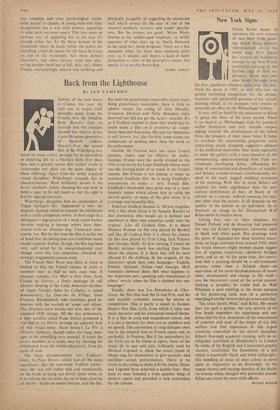Back from the Lighthouse
By IAN CAMERON
AMONG all the new waves at Cannes this year, the only one to acquit itself decently, apart from the French, was the Swedish. Both Raven's End (in festival) and 491 (outside) showed that there is at last a post-Bergman generation
of Swedish cinema.
Raven's End, the second film of Bo Widerberg, was
hated by many critics, perhaps for its naturalism in depicting life in a Thirtie's slum. For once, here was a gloomy movie that neither revels in catastrophe nor plays on the quiet dignity of those suffering. Apart from his newly acquired visual discipline, Widerberg's strength lies in characterisation. Most brilliantly drawn is the hero's alcoholic father, showing his son how to hold a cigar in his left hand so that his right is free for signing contracts.
Widerberg's discipline had no counterpart in
Vilgot Sjoman's 491. Apparently a very shy director, Sjoman aimed to conquer his inhibitions with a really outspoken movie. A final stage in a delinquent's degradation of a weak social worker involves making a teenage whore have inter- course with an Alsatian dog. Unnatural inter- course, too. But by this time the film is so far out of hand that the daring does not contribute much except surprise. Earlier, though, the film has been very well acted by its non-professional cast,
though even this was sometimes obscured by vexingly fragmented camera-work.
The French New Wave was there in force to
remind us that the French cinema in crisis is nowhere near as bad as ours once was. A pleasant comedy. Un Mari a Prix Fixe, from Claude de Givray; a lively montage of still pictures dancing to the Latin American rhythms of Agnes Varda's Salut les Cuhains; a sound documentary, La Douceur du Village, from Francois Reichenbach, who combines good in- tentions with the warmth of 'scope and colour. The directors were mainly not new, but of the
• standard 1958 vintage. Of the two newcomers
a lady novelist called Paule Delsol produced a real dud in La Derive through an apparent lack of any visual sense. Main Jessua's La Vie a l'Envers, however, though miles too long, man- ages to do something very unusual. It treats the hero's madness in a comic way by showing his withdrawal from the world subjectively from his point of view.
The main disappointment was Truffaut's
latest, La Peau Douce, which had all the main ingredients, like the renowned Truffaut tender- ness, but was still rather dull and occasionally on the brink of being real drivel. Quite often, as it' to enliven the narrative, he cut in huge close-up of details—hands on starter buttons, and the like. But until the gratuitously inexorable climax starts being gratuitously inexorable, there is little to admire except the acting of Jean Desailly, Francoise Dorleac, and Nelly Benedetti (who deserved but did not get the actors' awards). It's as if Truffaut wanted to show that world that he could make a film on le probletrze du couple better than that Antonioni. His hate for Antonioni is well known, but, alas for him, some scenes are reminiscent of nothing more than the work of his arch-enemy.
Outside the Festival were two more French pictures, fader and Le Mepris. In Judex, Georges Franju uses the world created in the 1916 serial movie by Louis Feuillade whose work was the starting-point of so much in the French cinema. But Franju is not aiming to make an imitation Feuillade film; he is using Feuillade's conventions to make a very Franju film. Feuillade's breakneck pace gives way to a more leisurely tempo which allows him to relish the surreal quality of many of the plot twists. It is a strange and beautiful film.
Jean-Luc Godard showed Le Mepris (together with a fine short about it by Jacques Rozier) so that journalists who would see it dubbed and mutilated in their own countries could view the original. Like all Godard films, it is about Modern Woman (in this case played by Bardot) and like all Godard filths it is about the cinema (in this case played by Fritz Lang, Jack Palance and Georgia Moll). At first viewing, I found the Bardot sections much less exciting than those about the cinema. It is these that will be most affected by the dubbing. In the original, all the characters speak their own languages—English, French, German, Italian—and Georgia Moll translates between them. But what happens to her important part, speaking only translations of others' words, when the film is dubbed into one language?
Finally, there was Les Parapluies' de Cher- bourg, the film that won the Grand Prix, and the only possible contender among the entries in competition. This is partly a sequel to Jacques Demy's first film, Lola, from which it takes one main character and his associated musical theme. It is a film in song and magnificent colour, but it is not a musical, for there are no numbers and no speech. The convention of sung dialogue owes less to the musical than to French opera and, in particular, to Poulenc. But if the antecedents for the form are to be found in opera, those of the music lie in pop and jazz, brilliantly used by Michael Legrand to allow the actors (none of whom sing for themselves) to give normal—and excellent—screen performances. There is no strain in the acting to make it fit the music. Demy and Legrand have achieved a double feat: they have at once founded a truly popular wing of modern opera and provided a new convention for the cinema.


































 Previous page
Previous page